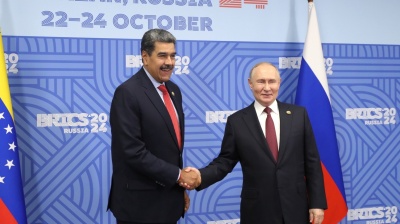Slovakia’s populist Prime Minister Robert Fico slammed German Chancellor Friedrich Merz for stating that Germany could propose EU block the EU funding for Hungary and Slovakia if the two countries diverge from EU policies.
“Words of the German Chancellor are absolutely unacceptable in modern Europe,” Fico wrote on his Facebook page in a post in which he shared comments he made during his trip to Armenia.
“Slovakia is not a small pupil who needs to be corrected,” Fico headlined the Facebook post before building up on his previous aggressive rhetoric against Brussels, which Fico and his Smer party adopted as they made way back to power in 2023, adding that “the politics of only one mandatory view is a denial of sovereignty and democracy.”
“If someone wants to implement the politics of only one mandatory view, then it is the end of democracy in Europe,” Fico was quoted as saying also by the Slovak press agency TASR, adding that “nobody can threaten us that if we won’t listen, then they will put us in order.”
Merz said earlier this week that the Hungarian and Slovak governments’ pro-Russian stance “constitutes a small minority, but we can’t let a small group dictate decisions,” and the EU could find itself in “conflict” with Bratislava and Budapest, Europe Pulse YouTube channel reported.
When asked about the options the EU has, Merz replied that “infringement proceedings” can be opened with countries at odds with the rule of law, and that “we can always withdraw the EU funds,” noting that “this has already been done with Hungary.”
“I don’t want these conflicts,” Merz added, saying that “if necessary, we’ll face it.”
Fico’s cabinet has been criticised at home and abroad since last year over the rule of law backsliding after introducing sweeping reforms in police and judiciary, anti-NGO draft bill, restructuring of the public broadcaster RTVS into STVR, as well as waves of purges in cultural institutions and other branches of the public administration.
Shortly after Fico’s comments, Minister of Investments and Regional Development Samuel Migal wrote on Facebook that “European legislators have the right to ask questions and Slovakia has a duty to respond.”
He added that “if we draw billions from the European budget, we have to observe the rules we agreed on together,” and that “I consider talk of ‘punishment’ or ‘harming Slovakia’ as completely absurd.”
Migal came to the helm of the important EU funds ministry only in March, after Fico restructured his cabinet and restored narrow parliamentary majority of 78 in the parliament of 150 by handing posts to the rebelling legislators from the Smer’s coalition allies, centre-left Hlas, which ejected Migal from its ranks in January, and ultranationalist SNS.
Just two months after the restructuring, the cabinet is facing renewed frictions just as the May 27 parliamentary session is to commence and is set to address the President Peter Pellegrini’s veto of the Smer-backed legislation securing life lifetime pension for the Prosecutor General.
The Hlas Minister of Education, Tomáš Drucker, told Slovak media Hlas won’t try to break the presidential veto, and leader Andrej Danko said his parliamentary grouping “also has objections” to some aspects of the legislation.
During the winter months, the country’s parliament appeared paralysed as it was unclear whether Fico’s coalition wielded a majority or not amid persisting disputes inside the ruling coalition.
Fico and his Smer party drifted deep into the national conservative waters and became dependent on the anti-establishment electorate, which in Slovakia traditionally has a strong pro-Russian element. Local observers project that tensions on the domestic front could push Fico further into radical pro-Russian and anti-EU positions to whip up polarisation in the country and mobilise support for Smer in the event of early elections.
News

Turkish state grabs another fintech as company seizures continue at pace
Turkey first seizes companies, then tries the suspects. Some companies are sold before the trial process.

Ukraine’s elite HUR forces turn the tide in the battle for Pokrovsk, as Russia’s effort to capture key logistics hub fails
The battle for Pokrovsk became intense early on November 1and it looked like the fall of the key logistics hub to Russia was imminent. But a bold counterattack by Ukraine’s elite HUR forces seems to have turned the tide.

US prepares attack on Venezuela as Maduro begs Putin for aid
The Trump administration has reportedly drawn up a list of potential military targets within Venezuela as part of its intensifying pressure on President Nicolás Maduro, who has turned to Moscow seeking urgent military assistance.

Bulgaria suspends fuel exports to EU after US sanctions Lukoil
Bulgaria has temporarily suspended exports of petroleum products to European Union countries after the United States imposed sanctions on Russian oil giant Lukoil.




